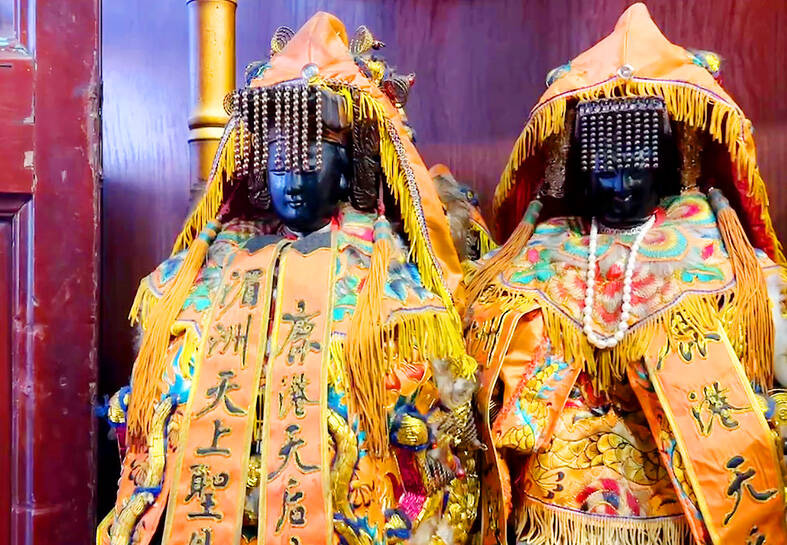Police in Changhua County earlier this month arrested a man in New Taipei City for allegedly selling statues borrowed from Matsu (媽祖) temples.
Lukang Township (鹿港) police said they on Nov. 12 arrested a 34-year-old man surnamed Hsu (許) in New Taipei City’s Sanchong District (三重) for allegedly selling a statue borrowed from Lukang Tianhou Temple.
Police were alerted after a buyer became suspicious of the statue purchased for NT$10,000 on a Web site for auctioning secondhand deity statues and other religious items.

Photo courtesy of a reader
The buyer told police that when he met Hsu, he said the statue was abandoned and not from a temple currently in operation.
However, the buyer said he was suspicious because the figure appeared to be recently used with a buildup of incense smoke on it.
After finding the name of Lukang Tianhou Temple imprinted on the statue’s outer robe, he said he called the temple, where temple officials confirmed that the statue belonged to them, adding that it is known as a “guest” Matsu statue, which can be “borrowed” for festivals or to celebrate a family event, then returned after the “residency period” is over, which is usually three days.
The buyer returned the statue to the temple and reported the incident to the Lukang Police Precinct on Nov. 10.
Police said that Hsu admitted borrowing the statue from the temple on Nov. 3 and listing it for sale online.
Hsu told police that he also borrowed a Sufuwangye (蘇府王爺) statue from Lukang Fengtian Temple and sold it online for NT$10,000.
Hsu faces fraud and embezzlement charges, police official Chang Sheng-sheng (張勝甥) said, adding that investigators are seeking to determine whether Hsu had any accomplices.
Lukang Tianhou Temple secretary-general Liu Chia-wen (劉家汶) said that worshipers can apply to borrow “guest” Matsu statues for free for private events.
“This is the first time we had a person apply for a statue using another person’s identity, and then sell it in an online auction,” Liu said.
The temple would now require two forms of identification from anyone applying to borrow one of the statues, he said.
The incident has attracted interest from the public to borrow “guest” Matsu statues, which are not the main Matsu statue of a temple, but usually among the secondary deities worshiped.
He said that people or local temples or shrines cannot apply to take out a specific statue, as the statue they would receive is chosen through a divination process.
“People usually go to their town’s major temple to ‘invite’ a god or goddess statue when having celebrations, such as a wedding, settling into a new home or opening a new store. It is an important tradition, and still observed by people in Lukang,” Liu said.

An essay competition jointly organized by a local writing society and a publisher affiliated with the Chinese Communist Party (CCP) might have contravened the Act Governing Relations Between the People of the Taiwan Area and the Mainland Area (臺灣地區與大陸地區人民關係條例), the Mainland Affairs Council (MAC) said on Thursday. “In this case, the partner organization is clearly an agency under the CCP’s Fujian Provincial Committee,” MAC Deputy Minister and spokesperson Liang Wen-chieh (梁文傑) said at a news briefing in Taipei. “It also involves bringing Taiwanese students to China with all-expenses-paid arrangements to attend award ceremonies and camps,” Liang said. Those two “characteristics” are typically sufficient

A magnitude 5.9 earthquake that struck about 33km off the coast of Hualien City was the "main shock" in a series of quakes in the area, with aftershocks expected over the next three days, the Central Weather Administration (CWA) said yesterday. Prior to the magnitude 5.9 quake shaking most of Taiwan at 6:53pm yesterday, six other earthquakes stronger than a magnitude of 4, starting with a magnitude 5.5 quake at 6:09pm, occurred in the area. CWA Seismological Center Director Wu Chien-fu (吳健富) confirmed that the quakes were all part of the same series and that the magnitude 5.5 temblor was

The brilliant blue waters, thick foliage and bucolic atmosphere on this seemingly idyllic archipelago deep in the Pacific Ocean belie the key role it now plays in a titanic geopolitical struggle. Palau is again on the front line as China, and the US and its allies prepare their forces in an intensifying contest for control over the Asia-Pacific region. The democratic nation of just 17,000 people hosts US-controlled airstrips and soon-to-be-completed radar installations that the US military describes as “critical” to monitoring vast swathes of water and airspace. It is also a key piece of the second island chain, a string of

The Central Weather Administration has issued a heat alert for southeastern Taiwan, warning of temperatures as high as 36°C today, while alerting some coastal areas of strong winds later in the day. Kaohsiung’s Neimen District (內門) and Pingtung County’s Neipu Township (內埔) are under an orange heat alert, which warns of temperatures as high as 36°C for three consecutive days, the CWA said, citing southwest winds. The heat would also extend to Tainan’s Nansi (楠西) and Yujing (玉井) districts, as well as Pingtung’s Gaoshu (高樹), Yanpu (鹽埔) and Majia (瑪家) townships, it said, forecasting highs of up to 36°C in those areas